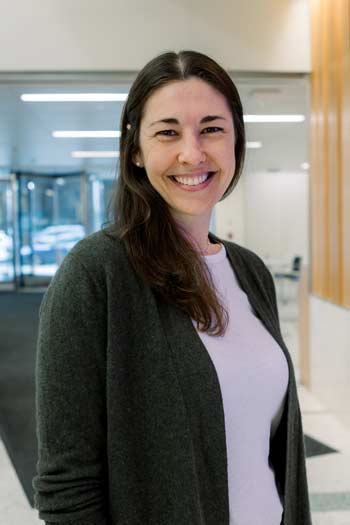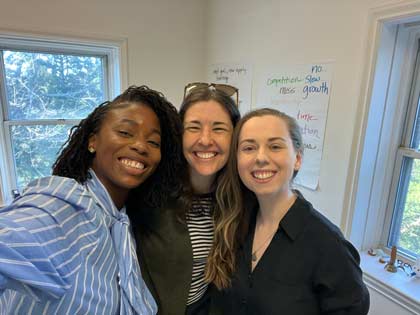
Why GC+ Academy Was Created
In the world of personalized health care, we never stop learning. Here at the Institute for Genomics Education, Workforce & Leadership, we are committed to developing the personalized health care workforce and offering workforce education programs that swell its ranks to provide more access to this life-saving care. With this vision in mind, we launched GC+ Academy, a portfolio of continuing education courses designed specifically for genetic counselors. Developed from the expressed professional development goals of genetic counselors, GC+ Academy provides courses and learning paths that help genetic counselors earn continuing education units (CEUs) while building valuable skills to work smarter, not harder, and grow their future career opportunities.

A Conversation with Claire Davis, Director of Curriculum
To share a bit about the philosophies behind GC+ Academy and to open up a larger discussion into continuing education, we interviewed the Institute’s own Claire Davis, director of curriculum and co-director of the Master’s program in Genome Health Analysis, co-created by NYU Grossman School of Medicine and Sarah Lawrence College. Claire is a leader in the creation and facilitation of educational programs for genetic counselors and guides the development of course curriculum for GC+ Academy in addition to teaching in the SLC and NYU graduate programs. We were thrilled to discuss the philosophical lens behind the creation of GC+ Academy with Claire, who is passionate about her work educating the next generation of personalized health care leaders.
Kelly Athman began their conversation with Claire’s “why” in becoming the director of curriculum and her approach to continuing education courses.
What Motivated the Creation of GC+ Academy?
Q: What themes or motivations brought you to become the Director of Curriculum for GC+ Academy?
CD: I really like to pick away at assumptions. One of the assumptions that I kept hearing over and over again from current genetic counseling students is “I just want to be ready at graduation,” and “I just want to be confident at graduation.” In response, I wanted to tell them that graduation is just one day! There is no switch that is going to get flipped here. You are learning now, and the learning you are doing now continues on that one day and through the rest of your career.
I started looking more at our professional learning as a continuum, which includes a solid graduate training foundation. I started thinking about how I could shift the focus from formal education to the kind of learning that we enact for ourselves every day and over the course of our careers, more the self-actualization piece. There’s no way to just set it and forget it when you’re talking about learning or mindset. The question is, how can we keep prompting and pushing forward in that personal development after that baseline training?
The impetus for the director of curriculum position was my desire to keep that continuum of professional learning going at a high-quality, high-speed pace. That’s hard to do on your own; you can only dig so deep to learn more when you are doing a lot in your job. I wanted to figure out how to support people who want to keep growing themselves in their careers.
There’s no way to just set it and forget it when you’re talking about learning or mindset.— Claire Davis
KA: I love that continuum example, and that resonates so much that we think at a certain point in time, we will just be ready. But you’re right; I am fifteen years post-graduation, and I have had a windy road of amazingness moving through different trials, tribulations, and specialties. It is a continuum, and you never know where those experiences or moments of education, time, and learning will take you.
CD: I love that you say that. Even just hearing that, I would wager (and you can tell me if I’m wrong) that the points at which we feel most confident, we’re not learning. Those regular boring moments of “I’ve got this,” everyday experiences when we might be a little bit checked out. It’s the status quo; that is not exciting. It’s when we are not at all confident that some approach or project will work out that we really have a chance to experiment and try new things, and that’s learning. Learning, in my current view, is deeply uncomfortable, but super exciting. We are trying to get people into that spot with GC+ Academy, where you can start to question the way you do things and imagine trying alternative approaches.
How GC+ Academy is Redefining Continuing Education
Q: It sounds like that is motivating for you as a longtime educator in the genomics space for genetic counseling professionals. What excites you about moving into this new phase of developing GC+ Academy?
CD: I think GC+ Academy is really exciting because you see the best instances of learning, and I feel like we are helping to evolve the way that learning works, similar to the way that we sometimes like to evolve the way that practice works. It’s about trying new things, experimenting, always questioning the assumptions on why we’re doing something, being very intentional about the new things that we try, and then doing all of that collectively and collaboratively.
It’s funny to say, but I now have a hard time with didactic learning. Knowledge is important, but I don’t think facts are at the heart of learning. Social learning - learning from each other, interacting, discussing - that’s when we air the assumptions and challenge them, where we get new ideas. That, to me, is a more vibrant, effective, challenging way to learn. I feel like the learning is of a higher quality than what we are all used to as learners in lecture halls. We design GC+ Academy to be learning as it can and should be - social, dynamic, and forward-looking rather than solidly grounded in some type of stolid knowledge base. Knowledge is important too, but that’s not how things move forward.
KA: Well, especially not in this fast-changing time of genetics, genomics, and precision medicine. The type of continuing education we’ve had in the past and in other areas or fields might still make sense, but we are constantly changing as a scientific community.
We design GC+ Academy to be learning as it can and should be - social, dynamic, and forward-looking.— Claire Davis
GC+ Academy's Philosophy: Social, Dynamic, Human
Q: Tell me a little bit about how the humans are involved within GC+ Academy in a way that is different from other types of continuing education. Why is that important?
CD: We strive to keep the human component at the center of GC+ Academy. The connection I make is with quantitative research, where we aim to extract the human as much as possible, to pull the person out of the study design, to objectify or sterilize the analysis to achieve some truth. This produces high-quality data, but the person isn’t present. GC+ Academy aligns with a qualitative model. I feel incredibly lucky to work with people whose personalities are baked into the design and development of our education. My hope is that the warmth, fun, and humor, as well as the rigor and intentionality of the people involved in this process, come through.

The whole GC+ Academy team is certainly holding to that philosophy, and we cultivate a culture around this learning that reflects these characteristics. Then we invite incredibly fascinating, creative, brilliant subject matter experts to interact with us and each other. We want their vibrance to come through, which is why we encourage them to share their experiences and engage in group conversations. It’s all designed to highlight the personalities. We are passionate about the topics, but we’re actually more passionate about other people’s passion for their work. If that passion can be shared, it draws people into the screen, ideally helping them to feel like “I am in this conversation. I have a connection with these people. I feel invited into this collegial, friendly, exploratory conversation,” that we are all working it out together. That, to me, is what we are trying to do to instill personhood, humanity, openness, and curiosity into these learning experiences.
KA: I think that is fabulous, and I wholly agree. The subject matter experts that we have gotten to come and share their wisdom in these different areas and their experiences make it come alive in a way that is so different from other types of continuing education that I have been in as a student, a counselor, or even outside of our field. I’ve done other types of online learning, and I would say that having these experiences and these wonderful, amazing experts in the field come together, talk, and discuss some of the challenges and opportunities for our field, it just jumps right off the screen.
CD: You are totally reminding me that I have not yet described that learner perspective! The course is designed to help somebody as the learner makes sense of a topic and consider how the ideas shared by experts might play out in their own work environments. So it’s not just that “I have to remember what they said,” it’s “what does it mean to me?” There is this huge emphasis on what do you think? And what does that mean to you both personally or in your work? The course is helping somebody to make personal meaning of what other people are thinking and saying.
KA: Exactly, and another differentiator is the learners can then say, “Oh, I do have an example in my job literally today,” that they can think about and decide how with this support and with this learning, to react maybe in a different way [today] or act in a different way in the future that they can really put that into practice and utilize those learnings going forward, which is so meaningful.
CD: It is, and it’s really fun.
From Burnout to Rejuvenation: A New Model for CEUs
Q: Last year, you discussed your passion for continuous learning in Part One of our Path to Precision Health series, particularly how learning in corporate and nonprofit environments can be more dynamic than a formal education setting. So, how do you see GC+ Academy and the courses that we were offering for CEU credit as a part of that ongoing, less formal education process you talked about in the continuum of learning you envision?
CD: I think this is something I really love about GC+ Academy, which is that it is designed to be a companion to that continuous learning that genetic counselors get a chance every day to do. The question is whether we recognize it, and then how do we respond to it? GC+ Academy is trying to be convenient and flexible for each learner, and to increase the chance that we can be a companion in making the most out of those daily learning opportunities. The idea is about bringing the learning as close as possible to the present moment because anytime there’s a gap between our learning and where we can apply it, we lose something in translation. GC+ Academy is trying to increase both the frequency and the effectiveness of the learning that can be done.
The other thing you’re reminding me of is a favorite quote by Thomas Skovolt: “The practitioner can have years of experience – rich, textured, illuminating, practice-changing professional experience in a helping, teaching, or health occupation. Or a person can have one year of experience repeated over and over again” (2001, p. 27). That’s the benefit of this kind of learning or reflection; it transforms a case with a routine indication into another opportunity for learning. Those will stack up instead of repeating, which is what helps us develop our mindset over time.
KA: Yes. As a genetic counselor in the field, I had those days where I would see 8-9 prenatal sessions back-to-back. No one wants to get to the place where they feel like each patient experience is going to be the same. But I think that is a symptom of burnout in some ways.
CD: I was going to say some people might like the routine, but I wonder if they are overwhelmed?
KA: Yes, that can be a sign that you do need to think about entering into other opportunities to make those experiences richer, so that you can continue to learn and grow, which I think honestly drives a lot of us to join the field of genetic counseling. GC+ Academy might be an opportunity to take out the monotony, if you will, in some of the work that we do, and think about it in a way that makes it a growth experience instead.
CD: Returning to the personalized asynchronous self-paced aspect and the point of burnout… We don’t always have energy to be eager for something new. Sometimes we are at zero battery, and new is not appealing. If we go to conferences, we have to do what we can in the time allotted. Alternatively, in GC+ Academy, you can skip a week or two or three or four; it’s OK if you just can’t do one more thing. But sometimes, just 30 minutes of new ideas recharge you a tiny bit and help you see things in a new way.
I love that flexibility; it feels honest about the mental load that we carry in our jobs because we are conscientious and we really want to do good work for our clients. It also flips the mirror a little bit and helps us see how we can do good work for ourselves. Sometimes learning is rejuvenative in a way that we don’t always think about.
KA: I think you touched on something really key, too, as far as the differentiation of how to approach GC+ Academy as a continuing education opportunity. I do think that reminding ourselves that you don’t have to do it all in that ten-hour crunch time period. You can take the different lessons as you need. You have up to two years to complete it. I think that is a great opportunity to think about how you might incorporate continuous, authentic professional learning into your practice.
CD: Yes, I think authentic learning actually suffers from forcing it. It is one of those things that you take in, let it percolate, see what connections you can make over the next week or so, and then come back with that reflection, take the next topic, and let it sit. I actually think that if you sat down and did the whole course in one day, it really wouldn’t serve you. It would be interesting, but it wouldn’t get to that next level of making you a tiny bit uncomfortable with questioning the way that you have been doing things, and give you the opportunity to experiment with trying to approach things in a different way, and then asking yourself how that went.
Actually, spacing it out is a great thing because the longer you stretch it, the more points of connection you have with the learning and your work, which will only feed the reflective component of the learning.
KA: I think that is really important for people to hear. I love the idea of taking a couple of friends, signing up [with them], and then having a once-monthly course club or something where you talk a little bit about things like the first lesson together. We also have the Community feature [on the platform] for that very reason. So even if you don’t have a friend or colleague, you can really feel and hear from other learners out there with the Community feature and connect on some of the different topics throughout the course at whichever place you’re at.
CD: I love that idea of getting together and doing it collectively. I think that could make it even more fun. As much of an introvert as I am, I do love the kinds of conversations that get inspired when you are all sitting together, experiencing something similar, reacting to it, and then reacting to each other’s reactions. That sounds really cool.
KA: Course clubs.
CD: Yes, course clubs! I love it.
Learn More or Connect with Us
Please join us in more crucial workforce and education conversations by reaching out to us via email with your questions, joining our contact list, and following with us on LinkedIn, where you can find out about each new GC+ Academy course and event. Current GC+ Academy courses include a variety of subjects covering technical as well as professional development topics such as Science Communications, Medical Ethics, Business Models, and more.
For further conversations with Claire and the GC+ Academy team, stop by our booth (#304) at the upcoming National Society of Genetic Counselors 44th Annual Conference happening in Seattle November 6-10, 2025. For additional reading on genetic counselor education, check out Claire’s recently published book on genetic counselor education, titled Education Theories and Techniques for Genetic Counselors, co-authored with Bonnie Jeanne Baty.